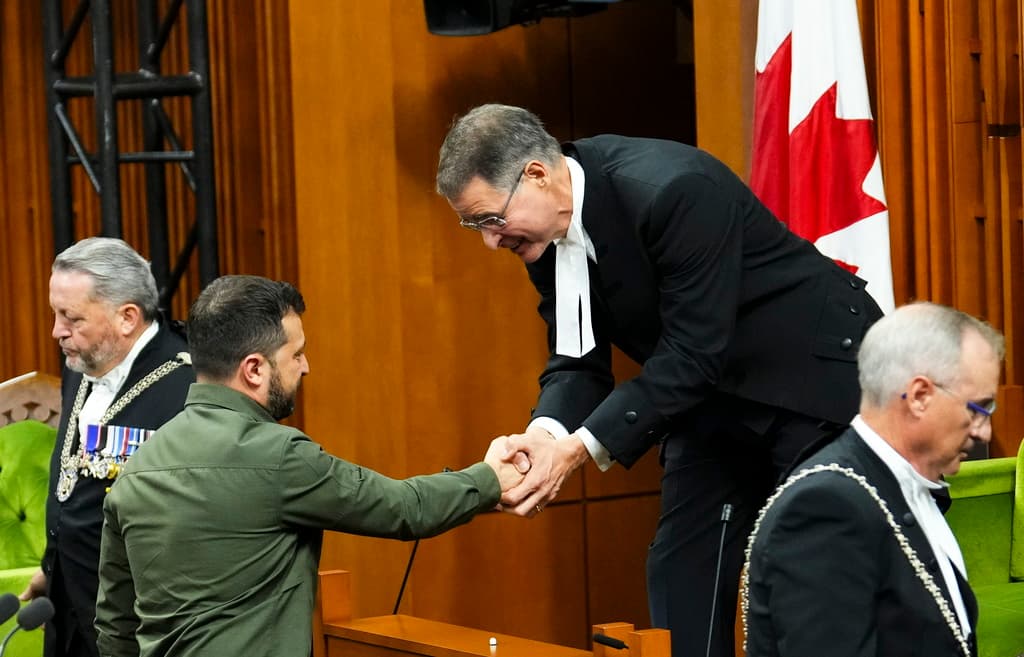Opposition Lawmakers Call on Canada’s House Speaker to Resign for Honoring Former Nazi Soldier
Prime Minister Justin Trudeau calls the incident ‘extremely upsetting.’

O, Canada. America’s neighbor to the north is reeling from an error of judgment that with a little due diligence could have been avoided: to wit, honoring a man who fought for a Nazi military unit during World War II in the House of Commons.
The furor that followed has caused Canadian opposition parties to call on the speaker of the House of Commons, Anthony Rota, to tender his resignation. Whether or not he will do so is not clear.
Yet the New Democratic Party House leader, Peter Julian, and the Bloc Quebecois leader, Yves-Francois Blanchet, both insist that Mr. Rota should step down.
“For the good of the institution of the House of Commons…I don’t believe you can continue in this role,” Mr. Julian said. “Regrettably I must respectfully ask that you step aside.”
At Ottawa on Friday, just after President Zelensky delivered an address at the House of Commons, Canadian lawmakers gave the 98-year-old Yaroslav Hunka a standing ovation when Mr. Rota drew attention to him. Mr. Rota introduced Mr. Hunka as a war hero who fought for the 1st Ukrainian Division.
The 1st Ukrainian Division was also known as the Waffen-SS Galicia Division, or the SS 14th Waffen Division, a voluntary unit that was under the command of the Nazis.
The Friends of Simon Wiesenthal Center for Holocaust Studies issued a statement Sunday saying the division “was responsible for the mass murder of innocent civilians with a level of brutality and malice that is unimaginable.”
In a statement written in French, Bloc Quebecois Leader Yves-Francois Blanchet said Mr. Rota had lost the confidence of the House. But Mr. Rota, who issued a written apology Sunday and repeated it in the House on Monday, did not immediately resign.
Opposition leader Pierre Poilievre blamed Prime Minister Trudeau and the Liberal government for creating a “massive diplomatic embarrassment and shame” for not properly vetting Mr. Hunka. They maintain that the guest list at Friday’s parliamentary session was simply not properly vetted.
“The prime minister is responsible,” the Conservative leader said. “Will he take responsibility for his latest embarrassment?”
Mr. Trudeau called the incident “extremely upsetting.”
“The speaker has acknowledged his mistake and has apologized,” Mr. Trudeau told reporters. “This is something that is deeply embarrassing to the Parliament of Canada and by extension to all Canadians.”
By Tuesday the scandal had escalated. Canada’s National Post reported that the Liberal government, headed by Mr. Trudeau, was trying to erase from the record of the House of Commons the celebration of the Nazi war veteran, but that the request was denied by the Conservatives who said to do so would be “absolutely wrong.”
At Moscow, meanwhile, a Kremlin spokesman, Dmitry Peskov, said it was “outrageous” that Yaroslav Hunka received a standing ovation. “Such a sloppy attitude toward this memory is, of course, outrageous,” Mr. Peskov said during his daily conference call with reporters.
He said Canada is among the Western countries that have raised a young generation who don’t understand the threat of fascism.
House government leader Karina Gould said the incident “hurt all of us in Parliament” but added that “Neither the government of Canada nor the delegation of the Ukraine had any knowledge of this.”
Ms. Gould said it was Mr. Rota’s decision to invite Hunka, and that “It’s been deeply embarrassing for Canada, and I think it was deeply embarrassing for the president of Ukraine.”
